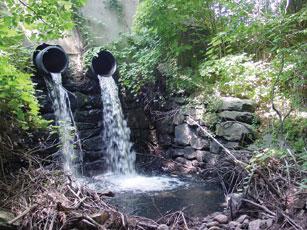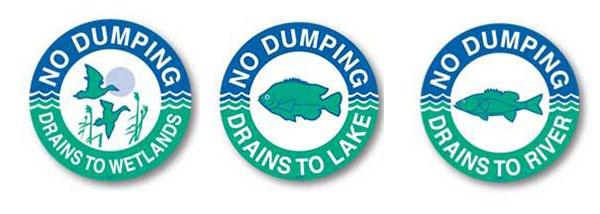NPDES MS4 Permit
The National Pollutant Discharge Elimination System (NPDES) permit program addresses water pollution by regulating point sources that discharge pollutants to waters of the United States. Created in 1972 by the Clean Water Act, the NPDES permit program is authorized to state governments by the Environmental Protection Agency (EPA) to perform many permitting, administrative and enforcement aspects of the program.
Additional Resources
- NPDES Stormwater Program
-
Open PDF file, 3.6 MB, Notice of Intent (NOI) (English, PDF 3.6 MB)
-
Open PDF file, 132.89 KB, Authorization Letter (English, PDF 132.89 KB)
-
Open PDF file, 223.9 KB, Authorization Extension Letter (English, PDF 223.9 KB)
DCR Stormwater Management Program
The DCR program to manage stormwater and improve water quality involves public education, public participation, illicit discharge detection and elimination, construction and post-construction stormwater management controls and good housekeeping. Good housekeeping involves street sweeping of parkways, cleaning street drains and associated drainage systems and using control measures to protect sensitive receiving waters. The list of DCR facilities and descriptions of the program elements are described in the Stormwater Management Plan.
Stormwater Management Plan, Operations and Maintenance (O+M) Plan DCR Annual Report
Annual Report Archive PY2 PY3 PY4 PY5 PY6
Illicit Discharge Detection and Elimination (IDDE) Program
The objective for the DCR IDDE program is to systematically find and eliminate illicit sources of non-stormwater discharges within its municipal separate storm sewer system (MS4). The IDDE program utilizes ArcGIS dashboards, maps, and apps to track catchment investigations, municipal coordination/interconnections, and progress. DCR IDDE Plan DCR IDDE Map DCR IDDE Summary Report DCR IDDE Summary Report Map
Impaired Waters Program
The objective for the DCR Impaired Waters program is to enhance existing and add new best management practices (BMPs)/stormwater control measures (SCMs) to reduce pollutants of concern discharging to waterbodies with water quality impairments and total maximum daily loads (TMDLs) related to urban stormwater runoff. The Impaired Waters program utilizes ArcGIS mapping data and web applications to aid in pollutant reduction load calculations and to accompany PCP/NSIR reports. Methods for Phosphorous Control Plan (PCP) & Nutrient Source Identification Report (NSIR) Development
Charles River Watershed PCP Lakes and Ponds Watersheds PCP DCR PCP Map
Blackstone River PSIR Long Island Sound NSIR Merrimack River PSIR Mother Brook PSIR Mount Hope Bay NSIR Mystic River PSIR Outer New Bedford Harbor NSIR
Proctor Brook NSIR-PSIR Ten Mile River PSIR DCR PSIR/NSIR Map
Stormwater Retrofit Opportunities Memo PCP Performance Evaluation Memo NSIR Implementation Memo Facility Updates Memo
Salt Reduction Plan Salt Brine Video Salt Brine vs Rock Salt Video DIY Salt Brine Video
Quinsigamond SCM poster (grant)
Total Daily Maximum Loads (TMDLs) 2018/2020 303d List 2022 303d List
Good Housekeeping Program
The objective for the DCR Good Housekeeping program is to ensure that stormwater pollution sources on agency properties and from maintenance operational activities are minimized. The Good Housekeeping program tracks/optimizes/manages inspections for: catch basins, surface / subsurface BMPs, and DCR labor yard facility stormwater pollution prevention plans (SWPPPS) through ArcGIS dashboards, maps, and applications. Street Sweeping & Leaf Removal Best Management Practices (BMPs) Structure Maintenance Castle Island Storm Drain Cleaning Video Esplanade Goose Waste Cleanup Post
Construction Site Runoff Control Program
The objective for the DCR Construction Site Runoff Control program is to minimize or eliminate erosion and maintain sediment on site. Construction General Permit (CGP) Information General Construction Stormwater Tips
Post-Construction Management Program
The objective for the DCR Post-Construction Management program is to reduce discharge and to retain/treat runoff from (re)development projects by constructing/maintaining SCMs.
DCR Stormwater Design Handbook DCR Stormwater Design Checklist
Public Education Program
The objective for the DCR Public Education program is to reduce pollutants by increasing knowledge and changing behaviors. Wachusett Educational Programs Waquoit Bay Educational Programs Stormwater Pollution Prevention Video Rain Garden Fact Sheet Dogs in DCR Parks Property Owner Guide
Longfellow Poster, Wachusett Poster, Bajko Poster
Public Participation Program
The objective for the DCR Public Participation program is to promote engagement in the implementation of the SWMP and environmental stewardship. Park Serve Day Coast Sweep
Water Supply Protection Program
The objective for the DCR Water Supply Protection Division is to promote drinking water quality through policy and planning. The Watershed Management Office covers metro Boston and Reservoirs while the Water Resources Office covers the entire Commonwealth. Division of Water Supply Protection
ArcGIS Stormwater Program Support
The objective of the ArcGIS Stormwater Program is to provide live data mapping as support to DCR NPDES-MS4 compliance. MS4 Map Drainage Map
What Can You Do to Help?
Pick up after your pet and properly dispose of waste · Use slow release fertilizers and apply only in appropriate concentrations · Apply pesticides and herbicides according to manufacturer specifications · Properly dispose of grass clippings and leaf litter · Wash cars on pervious areas that do not drain to catch basins · Maintain equipment and vehicles to prevent leaks and drips · Properly maintain all septic systems
Pollution Prevention
To keep our collective water supply clean and safe, reference the following brochures, fact sheets and reports at:
brochures-fact-sheets-reports | mass.gov
To report a spill of oil or hazardous material first call your local Fire Department, then call MassDEP Emergency Response:
(888) 304-1133
To report a dumping issue or drainage problem on DCR property
Call: (617) 626-1250
E-Mail: mass.parks@mass.gov
To Learn More
US Environmental Protection Agency (EPA)
National Pollutant Discharge Elimination System (NPDES)
Stormwater Program
npdes stormwater program | epa.gov
Massachusetts Department of Environmental Protection (DEP)
Stormwater Permitting
stormwater permitting | mass.gov
Think Blue Massachusetts


